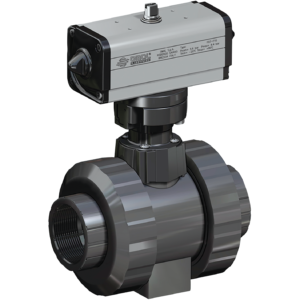Pneumatic Actuated PVC Ball Valves
Pneumatic-actuated PVC ball valves are a game-changer when it comes to fluid control. Whether it’s in chemical plants, water treatment facilities, or any other industrial setting, these valves offer superior performance and reliability. In this article, we will explore the benefits of pneumatic actuated PVC ball valves and why they should be your top choice for fluid control applications.
What is a Pneumatically Actuated Ball Valve?
A pneumatically actuated ball valve is a type of valve that uses air pressure to control the opening and closing of a ball inside the valve body. This type of valve is commonly used in industrial applications where precise control of fluid flow is required. The pneumatic actuator is connected to the valve body and uses compressed air to move the ball into different positions, either fully open or fully closed. When the ball is in the open position, fluid can flow through the valve, and when it is closed, the flow is blocked. This type of valve is known for its reliability, durability, and ability to operate in high-pressure environments.
What are the Benefits of PVC Pneumatic Actuated Ball Valves?
PVC pneumatic actuated ball valves offer numerous advantages. They are highly durable and resistant to corrosion, making them suitable for use in harsh environments.
One of the key benefits of these valves is their versatility. Their ability to handle different types of fluids, such as water, oil, and corrosive chemicals, makes them highly adaptable to different applications.
Another advantage of PVC pneumatic actuated ball valves is their ease of installation and maintenance. These valves are designed to be user-friendly, allowing for quick and hassle-free installation. They also require minimal maintenance, reducing downtime and operational costs.
Furthermore, the pneumatic actuation of these valves enables remote operation, providing convenience and flexibility. This feature allows for centralised control and automation, enhancing efficiency and productivity.

Applications of PVC Pneumatically Actuated Ball Valves
PVC pneumatic actuated ball valves have a wide range of applications in industries where fluid control is critical. Some specific applications include:
Chemical Plants
PVC pneumatic actuated ball valves are commonly used in chemical plants to control the flow of corrosive chemicals. Their resistance to corrosion makes them ideal for handling these harsh substances.
Water Treatment Facilities
These valves are also widely used in water treatment facilities to control the flow of water and other fluids. Their durability and ability to handle different types of fluids make them suitable for this application.
HVAC Systems
HVAC systems require precise control over the flow of air and water. PVC pneumatic actuated ball valves provide efficient and reliable control in these systems, ensuring optimal performance and energy efficiency.
Oil and Gas Industry
In the oil and gas industry, PVC pneumatic actuated ball valves are used to control the flow of oil, gas, and other fluids. Their ability to operate in high-pressure environments and resistance to corrosion make them essential in this industry.
Manufacturing Processes
PVC pneumatic actuated ball valves are often used in various manufacturing processes, such as food and beverage production, pharmaceutical manufacturing, and pulp and paper processing. They provide reliable and efficient control over the flow of fluids in these processes.
In all of these applications, PVC pneumatic actuated ball valves offer precise control, durability, resistance to corrosion, and ease of installation and maintenance.
Conclusion
In conclusion, when it comes to choosing the right valve for your piping system, pneumatic actuated PVC ball valves are the way to go. With their durability, reliability, and ease of use, these valves will ensure smooth and efficient operation. So why settle for anything less? Upgrade your system today and experience the difference yourself!
Next up, check out our article on what are plastic valves?
